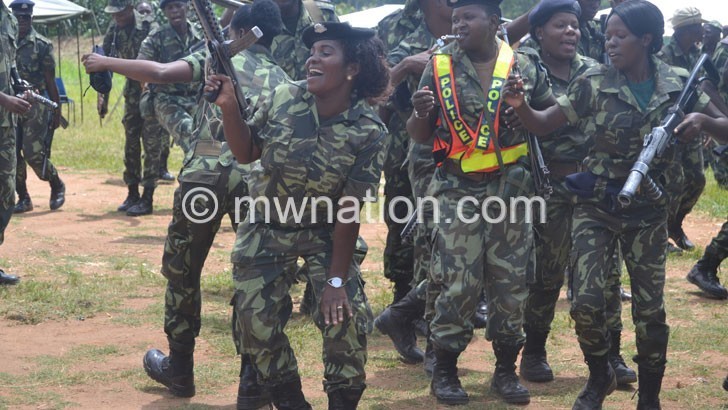1 600 more police officers promoted
Fresh from criticism over the mass promotion of 7 000 police officers and 20 210 primary and secondary school teachers, government has promoted an additional 1 602 junior police officers, raising fears of a bloated wage bill.
The latest promotions have raised the number of promoted police officers from 7 000 to about 8 602. When combined with the teachers, the number of personnel promoted in the past four weeks stands at 28 812.

In an interview yesterday, National Police spokesperson James Kadadzera confirmed news of the promotions, but said the promoted officers were those skipped on the list of the first promotions due to technical errors.
He said: “They [promoted officers] were supposed to be there, but because of some reasons, they were skipped. But I will not say anything on the total because I am not in the office.”
Both the initial and latest promotions are effective April 19 2019, according to Kadadzera.
Minister of Finance, Economic Planning and Development Goodall Gondwe yesterday said in an interview that government has used the unforeseen expenditure vote in the K1.4 trillion 2018/19 National Budget to accommodate recent promotions of teachers and police officers.
The minister dismissed fears that the recent promotions of teachers and police officers would lead to the burgeoning of the public service wage bill.
He said: “Yes, we did the promotions for teachers and police officers. This has no serious impact on the budget as we used the unforeseen vote.
“We have this unforeseen expenditure every year as part of the budget. There might be some impact, but that will be mild.”
Gondwe said the government wage bill currently stands at K396 billion which, he said, is within the internationally acceptable standards.
He said as part of Malawi’s agreement with the International Monetary Fund (IMF) under the fund’s supported programme, the Extended Credit Facility (ECF), the government wage bill should not exceed nine percent of the normal gross domestic product (GDP) currently valued at $6.3 billion (about K4.6 trillion).
Our calculation shows that at K396 billion, the wage bill to nominal GDP ratio stands at 8.5 percent. In recent years, the public service wage bill has been steadily increasing and is more than double a wage bill of K163.3 billion four years ago in March 2015.
The wage bill is also about 28 percent of the K1.4 trillion revised 2018/19 National Budget whose recurrent expenditures are pegged at K1.1 trillion and the development budget at K300 billion.
The wage bill proportion worsens to over 35 percent when compared with the recurrent budget where personal emoluments fall. The recurrent account provides money for running ministries, departments and agencies (MDAs). As the situation stands, it means that for every K100 allocated to run MDAs, K35 is used to pay civil servants, leaving little fiscal space.
But Gondwe, who last week reacted to a demand for promotions by the Civil Service Trade Union (CSTU) by stating that practically government could not afford, yesterday admitted further promotions would not be good for the country.
He said: “We should not be contemplating more and more promotions because that will increase the wage bill. But police and teachers, we can accommodate. Anything else will not be good for us.”
Economic and governance analysts yesterday expressed concern with the recent spate of promotions in the public service, saying it would have adverse effects on the economy as well as ripple effects in the aftermath of the May 21 2019 Tripartite Elections.
In his reaction, Economics Association of Malawi (Ecama) president Chikumbutso Kalilombe observed that the promotions have only been effected for the benefit of specific ranks within the law enforcing agency.
He said: “Apart from economic implications, I don’t know whether these promotions will enhance efficiency in government.
“These promotions are ill-timed. They could be good to those promoted, but we have not heard about these promotions mentioned in the budget.”
While commending government for promoting employees in the public sector, governance and political commentator Henry Chingaipe yesterday blamed authorities for “running away from sticking to stipulated processes of promoting people”.
He said: “Everybody in the public service is looking for career development, so it is not bad to promote people. However, the system which government is using is not institutionalised and structured. These promotions are just done for appeasement. That is so worrying.”
Chingaipe said government should ensure a credible public service where systems governing promotions are followed, predictable and free from political interference.
On possible implications of the move, he warned this will have a negative effect after the elections in the event that the governing Democratic Progressive Party (DPP) fails to retain power.
Chingaipe cited former president Joyce Banda’s administration which promoted some chiefs and district commissioners (DCs) in the run up to the May 20 2014 Tripartite Elections.
Banda lost the elections and the DPP administration inherited the pressure to handle queries from both chiefs and DCs demanding their new perks. Some of the cases ended up in courts.
The latest promotions have come barely a week after CSTU and Malawi Prison Service (MPS) officers also demanded promotions.
Last week, CSTU gave government a 14-day ultimatum to promote long serving officers in the mainstream civil service to fill a 40 percent vacancy rate, but Gondwe said doing so would mean implementing a general salary increase.
In an interview yesterday, CSTU general secretary Madalitso Njolomole argued that civil servants deserve equal treatment, especially after government indicated last year that it would not effect promotions in the public sector due to lack of financial resources.
There are about 110 000 workers in the mainstream civil service.
Recently, government also raised chiefs’ honoraria, but they got their increase, including arrears this month, a few weeks away from polls.
Teachers and police officers are the key stakeholders in the electoral process. Teachers are usually used as polling officers while police officers provide security. Their promotions have come at a time when the highly contentious May 21 2019 Tripartite Elections are around the corner.





